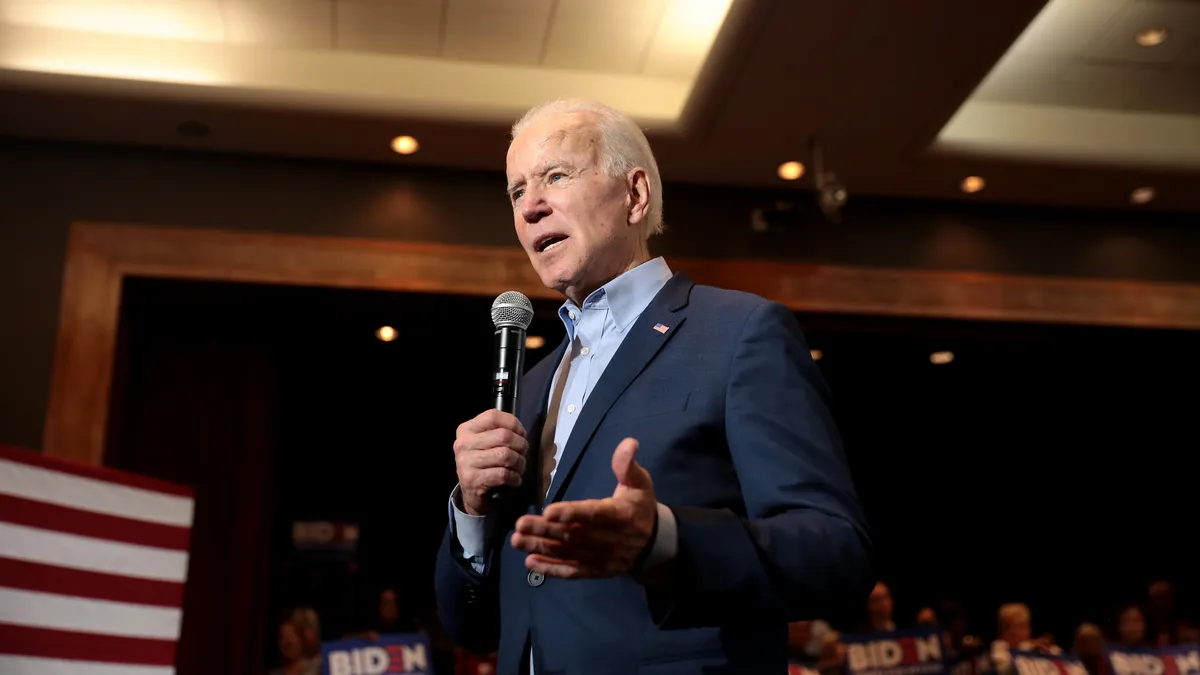Dive Brief:
- Joe Biden reaffirmed his plan to back a $15 federal minimum wage and end the tipped minimum wage in a Sept. 7 tweet.
- The Democratic Party nominee for president in the 2020 election also said he supports an end to the subminimum wage for workers with disabilities and aims to “ensure everyone has strong benefits.”
- Biden’s labor policy platform also said he plans to hold employers accountable for wage theft, union busting and worker classification. The Biden campaign did not respond to a request for comment.
Dive Insight:
Biden had already expressed his support for the $15 minimum wage and ending the tipped minimum wage, and the mention of the subminimum wage for workers with disabilities touched on a similarly controversial subject. Many disability advocates have worked to end the option for years, saying the U.S. Department of Labor program is often abused, while others argue it provides employment for those who would not otherwise have such an opportunity.
Even before the pandemic, Americans’ preference for increasing the minimum wage had been growing. A Pew Research poll from July 2019 showed two-thirds of respondents supported raising the federal minimum wage to $15 per hour. In the pre-pandemic employment market, which heavily favored workers, some employers were starting to offer $15 an hour as a way to attract candidates. Many states also took action to increase their minimum wages.
COVID-19 has also increased awareness of the demands of hourly workers in industries such as food service, healthcare and manufacturing who were deemed essential during pandemic-driven shutdowns — particularly through improved safety measures, compensation and benefits. The pandemic also revealed sharp racial wage gaps among workers in New York, with Black women tipped workers making almost $5 less than White men tipped workers, according to a One Fair Wage study.
Restaurants such as Union Square Hospitality Group and restaurateurs David Chang and Tom Colicchio have tried no-tipping models, but later reversed those decisions. For Union Square Hospitality, the decision was made to allow employees to earn as much money as possible during the pandemic.
Some states and cities have provided test cases for a $15 minimum wage. San Francisco for example, will soon reach such a minimum while also subject to a tip credit ban. And while a 2019 Congressional Budget Office study said a $15 minimum wage would result in 1.3 million lost jobs, other research disputed that effect, at least in low-income areas. Last year, the National Restaurant Association criticized proposed legislation to raise the federal minimum wage to $15 over the next four years and eliminate the tip credit. The NRA argued that this move would stifle the generation of new restaurant jobs and be a burden for small business operators whose communities have disparate costs of living across the country. The association also claimed that abolishing the tip credit could hurt restaurant employees, and recent efforts to end the tip credit in Washington, D.C., Michigan and Maine have flopped.
Emma Liem Becket and Julie Littman contributed to this article.












